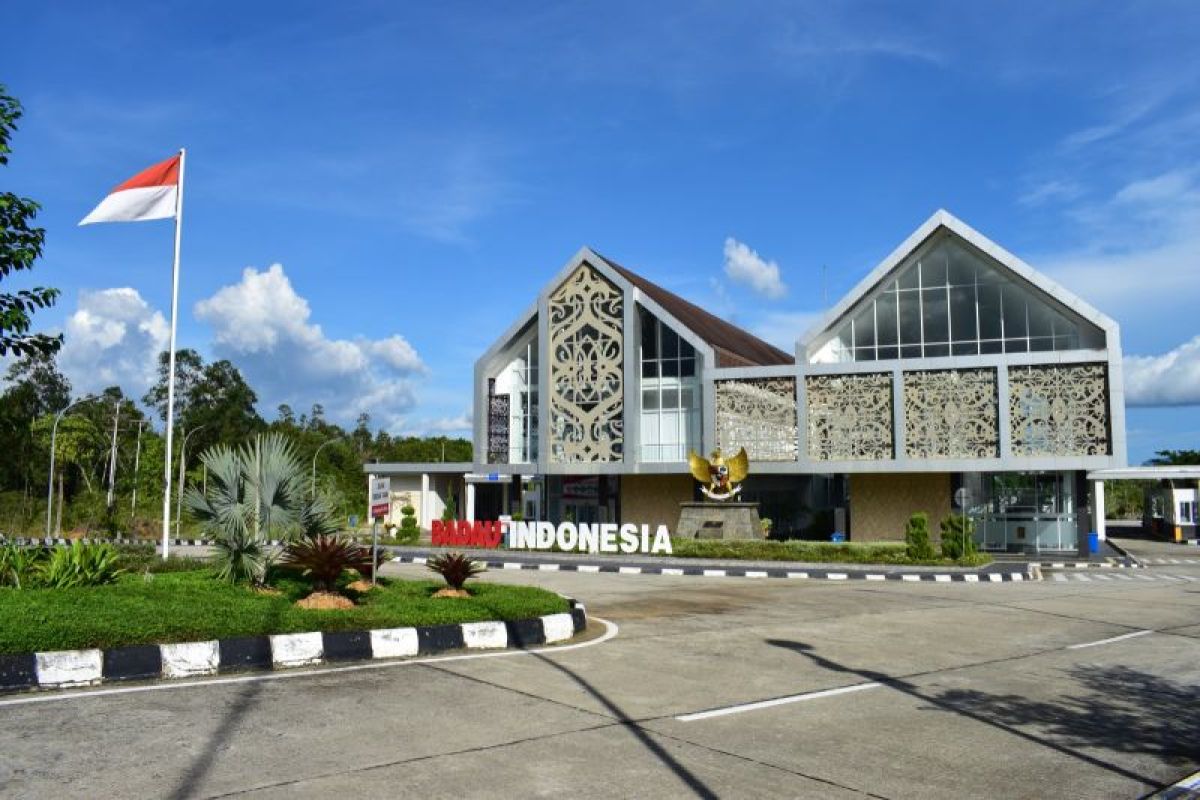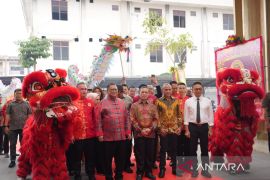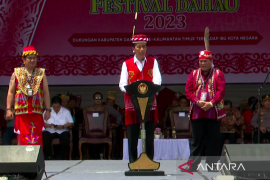In West Kalimantan, there is a cross-border post (PLBN) in Badau, Kapuas Hulu District. Since its inauguration by President Joko Widodo (Jokowi) in 2017, the post has served the Indonesian nation by monitoring the crossing of people and goods to and from Lubok Antu in Sarawak.
Head of PLBN Badau, Wendelinus Fanu, said that people living in the border region have been reaping economic benefits from the operations of the cross-border post.
This year, the number of people crossing through the post has reached 70,000, with an average of 250-300 per day. Moreover, the PLBN has been facilitating the flow of Indonesia’s exports.
This positive trend has been the result of efforts made by Indonesia’s National Border Management Agency (BNPP) to provide citizens with one-stop customs, immigration, and quarantine services at PLBNs by collaborating with other institutions, such as the Finance Ministry and the Indonesian Quarantine Agency.
“PLBN Badau will continue to provide the finest services to people. Here, institutions, agencies, and the officers assigned have continued to work in ever-improving synergy,” Fanu remarked.
The Indonesian and Malaysian governments have reached a range of cooperation agreements in the hope of bolstering their shared commitment to creating and maintaining safe and prosperous border areas.
It is even possible to trace this matter back half a century, when the two countries rolled out a bilateral border trade agreement in 1970, driven by their desire to offer greater convenience to people residing along the borderlines to meet their staple needs through cross-border trade activities.
On Indonesia's side of the border, the agreement seeks to serve merchants and residents operating in Kapuas Hulu’s sub-districts of Badau, Lupar, Embaloh Hulu, Empanang, and Puring Kencana, which are adjacent to Malaysian territory.
“Cross-border transactions in the region are done within the agreed provisions,” Fanu stated, implying that the agreement covers specific types of goods.
Since its inception, the bilateral trade agreement has been implemented as a five-year deal that is automatically renewed for another five years unless Indonesia or Malaysia withdraws or proposes amendments through diplomatic mechanisms.
The latest renewal of the agreement took place in June last year.
Seven years since its inauguration, PLBN Badau has proven to be an icon of Indonesian pride, particularly in the eyes of those residing in Kapuas Hulu District, thanks to the post’s contribution to both local and national economic growth.
The post's presence can also be seen as a manifestation of the government’s genuine care for Indonesia’s frontiers and their residents.
With the goal of affirming Indonesia’s sovereignty over parts of Kalimantan in mind, the government designated PLBN Badau as the venue for a ceremony marking the country’s 79th Independence Day anniversary on August 17, 2024.
During the ceremony, Purnomo Sucipto, the Cabinet Secretariat’s Deputy for Political, Legal, and Security Affairs, emphasized that the development of Indonesia’s border regions is paramount to strengthening the country’s sovereignty and boosting prosperity.
“More than a mere territorial limit, a border region functions as the face of the Indonesian nation in the eyes of the world,” he remarked in a statement.
He also stressed that Indonesia should make the most of its PLBNs as gateways to send a surge of domestically made commodities to neighboring countries.
It is worth noting that the development of border regions has been one of the government’s priorities. President Jokowi has been pushing his administration to pursue equitable development in all regions to elevate the living standards of citizens equally, including those residing in border areas.
The government has pinned its hopes on PLBN Badau, envisioning it as a hotspot for exports in West Kalimantan.
The cross-border post is expected to play an even greater role nationally, given that Kapuas Hulu has potential export products to offer. Moreover, the district shares direct borders not only with Malaysia but also with East Kalimantan, where Indonesia’s new capital city, Nusantara, is being developed.
Additionally, PLBN Badau has been serving as the entry point for foreign tourists seeking to visit Kapuas Hulu’s tourism destinations, such as the Lake Sentarum National Park and various local cultural tourism attractions.
The tourism sector of Kapuas Hulu is projected to reach the next level due to the ever-improving services provided by the post and the presence of a reliable national road connecting the post to Putussibau, the district’s seat of government.
In a nutshell, it would not be an exaggeration to say that PLBN Badau has almost everything it needs to shine both as a major gateway for trade and tourism and as another tangible icon that affirms Indonesia’s sovereignty over parts of Kalimantan Island.
Related news: BNPP to hold Independence Day ceremonies at 13 border posts
Related news: PLBNs in West Kalimantan: How cross-border posts boost local economies
Translator: Teofilusianto T, Tegar Nurfitra
Editor: Anton Santoso
Copyright © ANTARA 2024












